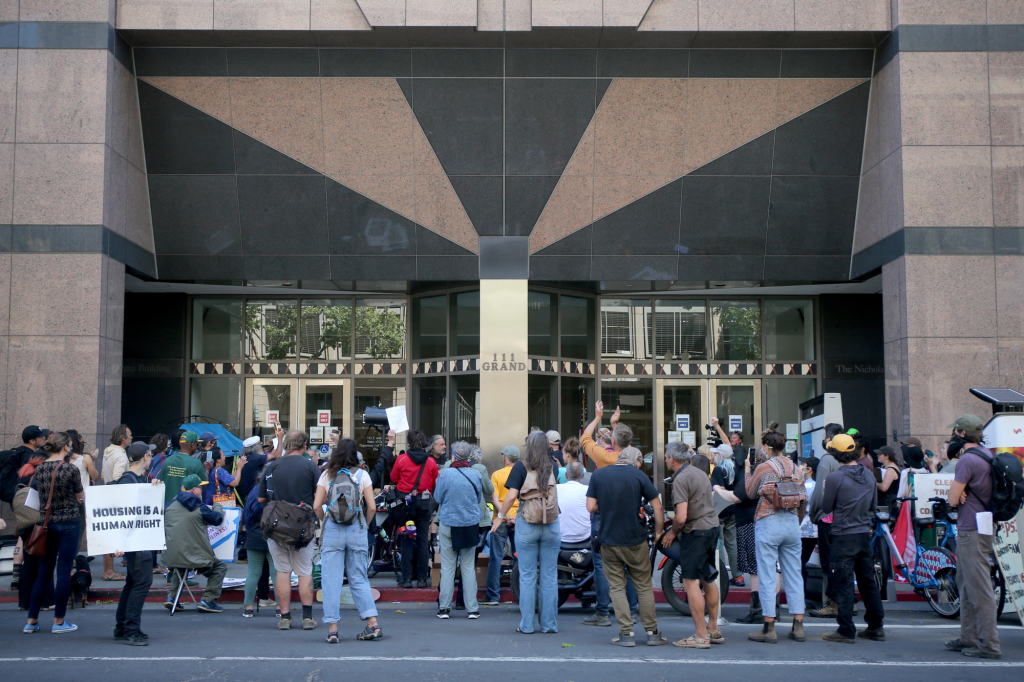As the Bay Area continues to move closer to a pre-COVID-19 normal, officials are starting to disband many of the homeless encampments that had been allowed to stay in place — and expand — throughout the pandemic.
But some camp residents aren’t going without a fight.
A coalition of activists and unhoused people representing encampments throughout the Bay Area joined forces Tuesday to demand local agencies stop displacing people from their camps. They argue COVID-19 remains a threat, and federal health guidelines — which recommend allowing camps to stay where they are if individual housing is not available — are still in place.
Yet as COVID-19 infection rates decline, vaccination rates increase and mask and social-distancing mandates ease, local authorities say some encampments that have grown during the pandemic present safety hazards and must be removed. Caltrans, which controls the land around freeways and under overpasses where unhoused people often sleep, already has plans to clear camps in the East Bay.
Court orders that for months have protected camps in Sausalito and Santa Cruz have expired, allowing the cities to remove or relocate people’s tents. A new anti-camping ordinance in Novato threatens a camp that has taken over Lee Gerner Park during the pandemic. And the San Jose City Council voted recently to resume clearing encampments, with a particular focus on camps near schools.
In response, Bay Area activists and unhoused residents are launching an initiative dubbed “Support not Sweeps” to pressure local leaders to stop the closures. Dozens of people set up tents and rallied outside Caltrans’ Oakland office Tuesday, chanting, beating a drum, shaking a tambourine and holding signs that said “Stop Caltrans evictions” and “Clear trash not communities.”
“Folks across the region have just decided that this is not acceptable,” Xochitl Bernadette Moreno, co-founder and director of Essential Food and Medicine, said before the rally. “And so we’re going to hold these decision-makers accountable and take our grievances to their front door, since they won’t listen to us and our repeated requests for good faith negotiations.”

Essential Food and Medicine is a grassroots group that works with people living in a massive encampment on Caltrans land off Wood Street in West Oakland, which includes make-shift shacks, tents, RVs and old buses converted into sleeping quarters. The group recently helped build an unsanctioned community center for camp residents with a hot shower, a first-aid clinic, a free store and a kitchen, all housed in whimsical buildings made of mud, sand and straw.
Last month, Caltrans sent a letter to Councilwoman Carroll Fife’s office detailing plans to close part of the encampment July 1.
“Over the last year, Oakland residents living across the street from this area have contacted the Oakland fire and police departments multiple times to report fires and explosions,” Caltrans spokeswoman Janis Mara wrote in an emailed statement. “The fires and explosions put everyone in the area at risk — including the people experiencing homelessness — given the extremely dry conditions.”
The closure would displace dozens of unhoused residents — estimates range from 50 to more than 100.
While the community center isn’t in the section of the camp slated for immediate closure, according to Justin Tombolesi, a constituent liaison in Fife’s office, he expects Caltrans eventually will target it for removal.
The city is making accommodations for some RV-dwellers to park on a vacant lot next to the Wood Street encampment, which will be outfitted with electrical, plumbing, case management and other services. The program, set to hold about 60 RVs, should open before the end of this month, Tombolesi said. The city also has plans to install tiny homes for other unhoused residents on a neighboring lot. But Tombolesi acknowledges those programs won’t accommodate everyone displaced from the encampment.

In Emeryville, a judge blocked the city’s attempt to remove a half-dozen people from an encampment on Shellmound Street in April. Last month, the judge ruled that in light of declining COVID-19 cases and increased availability of vaccinations, the camp is no longer entitled to that protection.
Shortly after, Caltrans gave notice that it planned to clear an adjacent camp on Shellmound of about 23 people on the agency’s land, according to another lawsuit. The activist group Where Do We Go Berkeley, which fights for the rights of unhoused people, quickly responded by suing Caltrans. A federal judge sided with the homeless plaintiffs, blocking the camp’s closure — for now. Both sides are due back in court next month.
Robbie Powelson was at the rally Tuesday representing a community of boat dwellers illegally anchored in Richardson Bay in Sausalito. Harbormaster Curtis Havel is ramping up efforts to remove boats from the area — focusing first on those he says are abandoned or not seaworthy — with the goal of clearing the harbor in five years. The city also recently got the OK from a federal judge to move an encampment from Dunphy Park, on the shore of Richardson Bay, to nearby Marinship Park — a move camp residents have fought for months.
Theo Cedar Jones, who lives in Oakland’s Wood Street encampment in a structure he made out of cloth and bamboo, loves the community in the camp. He said residents have weekly meetings and have been clearing dumped debris.
“We urgently need the public to know that we don’t want to move, and we’re cleaning the place up,” 57-year-old Jones said. “We’re doing good for society down there, and we want not to be evicted.”










